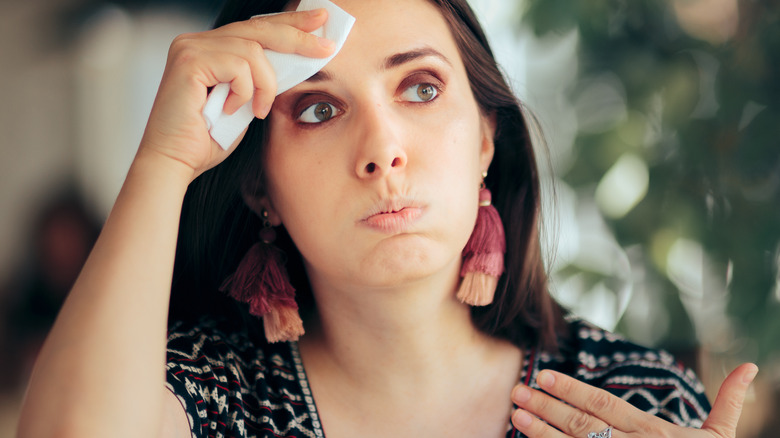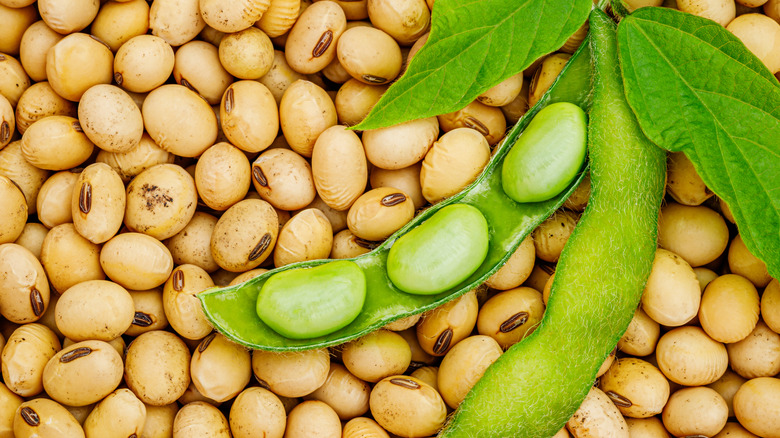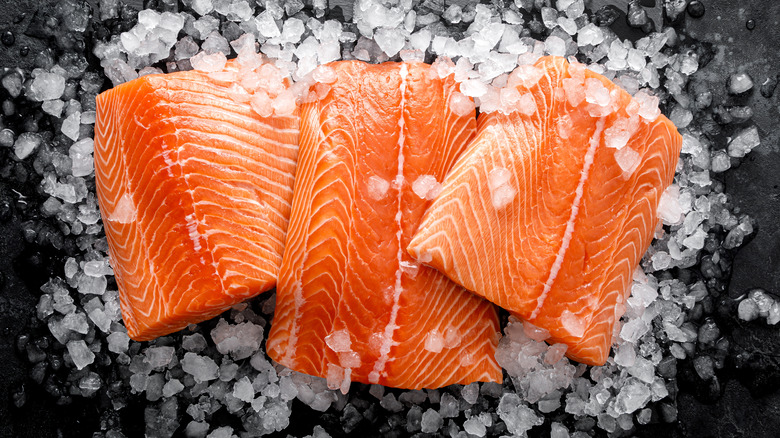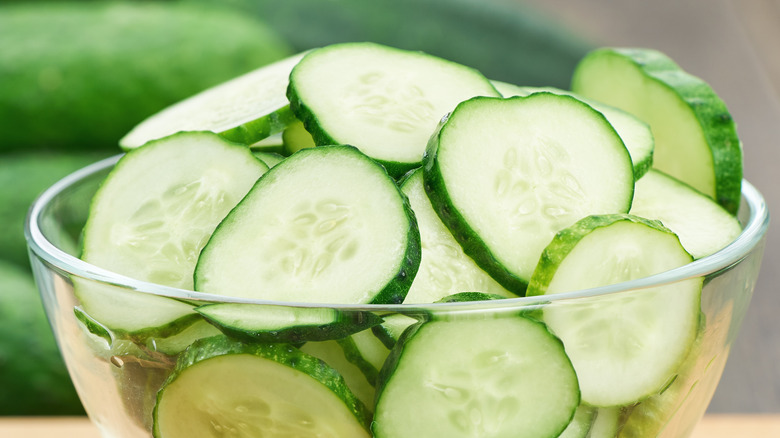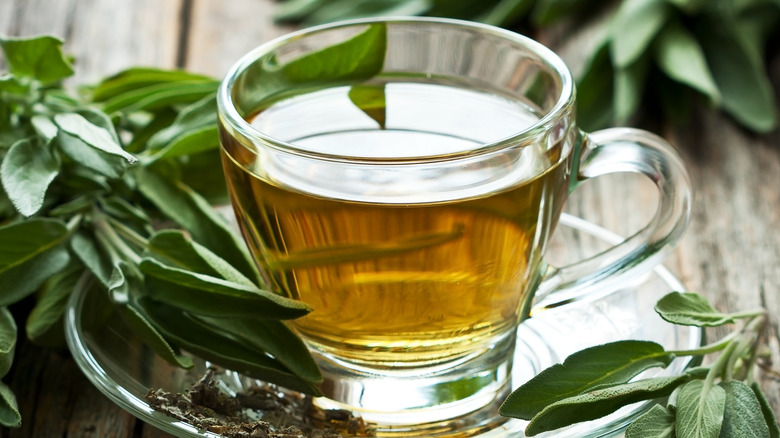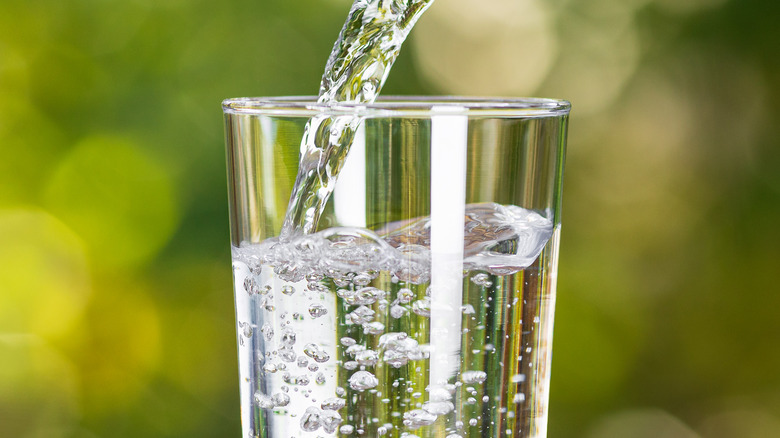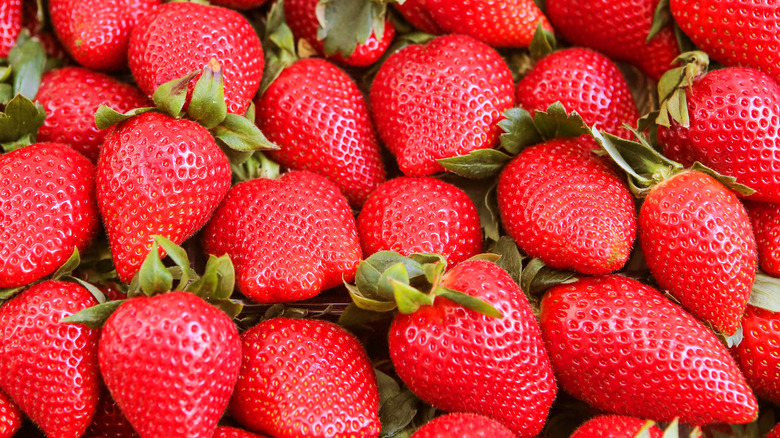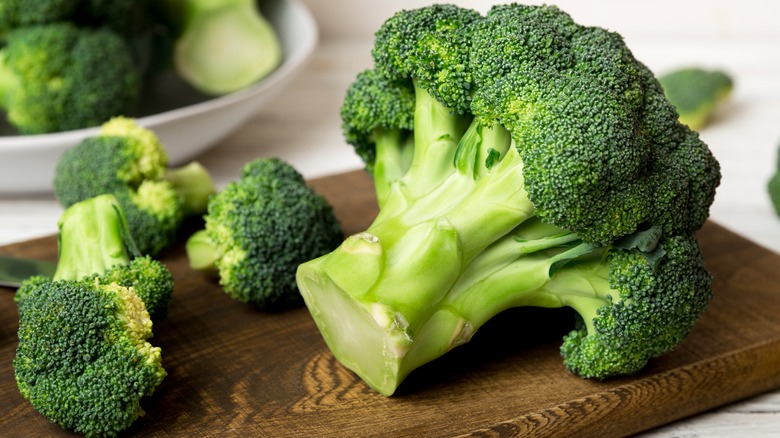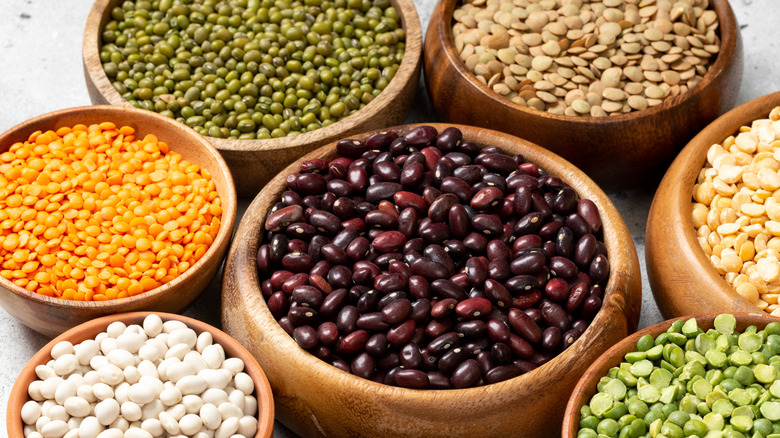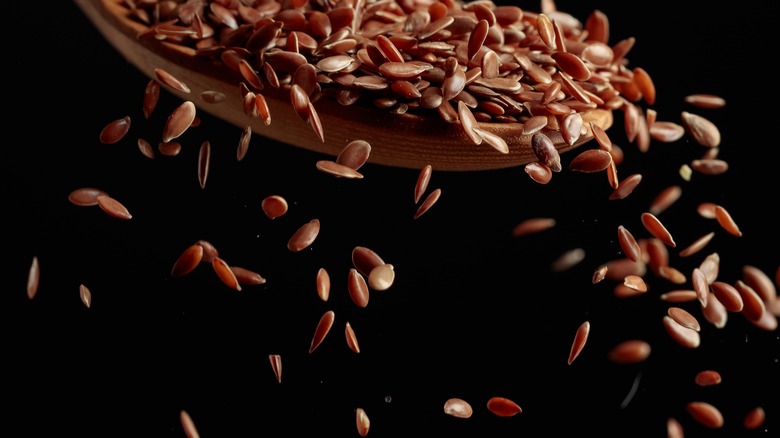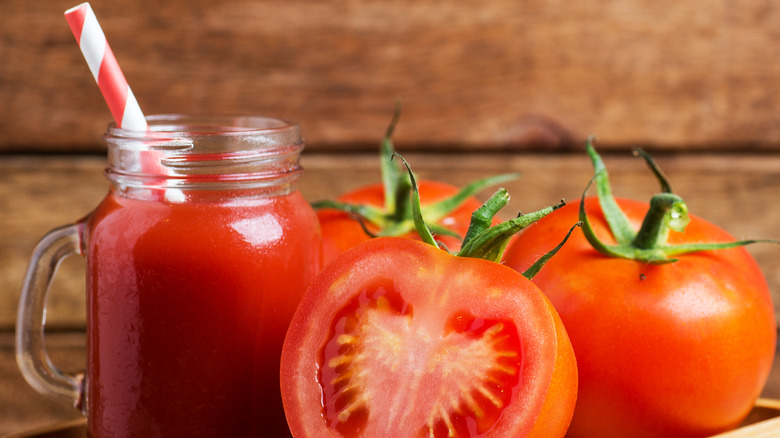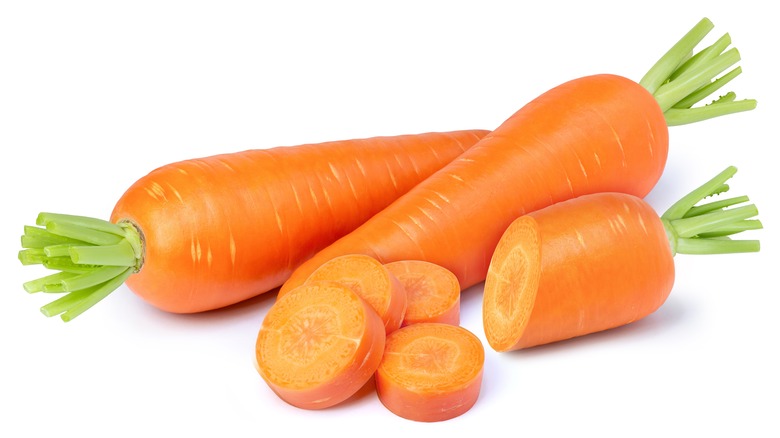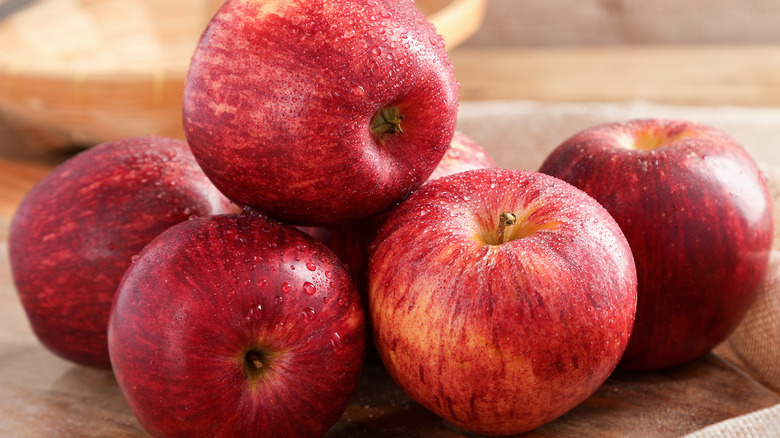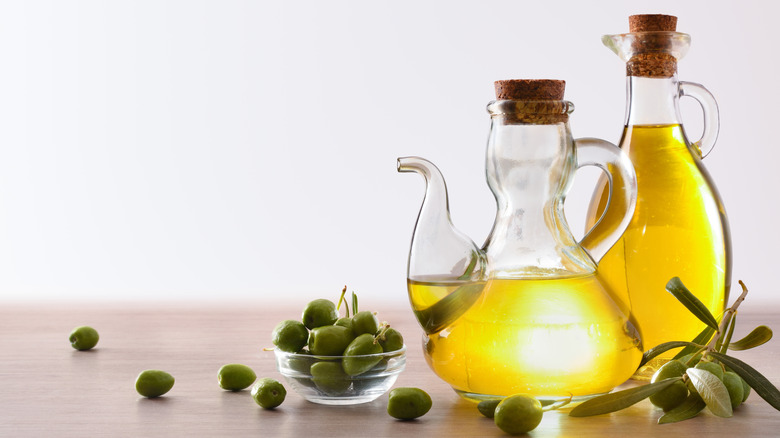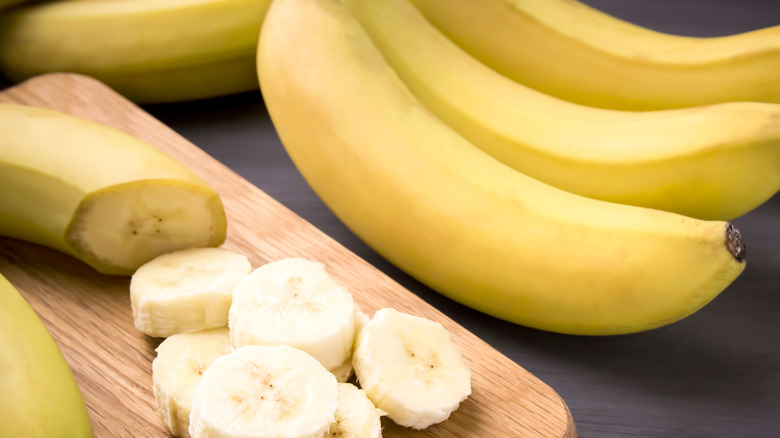Foods You Should Eat To Help Prevent Hot Flashes
Imagine this: A woman suddenly she feels a warm sensation throughout her chest, neck, and face. Her heart begins beating faster, and she feels anxious. Taking a mirror out of her purse, she confirms that her skin is red and blotchy. Although she's not happy, she's spoken with her doctor and knows exactly what's happening to her: She's experiencing a hot flash.
As the Mayo Clinic explains, the above symptoms — as well as perspiration, mainly on the upper part of one's body — can all happen when someone has a hot flash. Additionally, as a hot flash ends, a person might feel chilled. These symptoms can also occur at night (i.e., night sweats) and interfere with sleep. It's no coincidence that the above scenario was about a woman, since women are more likely to have hot flashes. And even though hot flashes can technically happen because of different medical conditions, they are extremely common during menopause.
For this reason, the majority of this article will focus on foods that address menopause-related hot flashes. However, it's important to keep in mind that there's debate about various foods recommended both for hot flashes and for menopause in general. You will find that research might be limited and/or mixed (and that there might be health concerns) regarding some of these items. We've covered some of the potential positive and negative aspects of these foods; still, before adding any of them to your diet, speak with a medical professional.
Soy products
There's no way to talk about foods that might help with hot flashes without talking about soy. Over the years, soy has been in the headlines for both potentially positive and negative reasons. So, if you're considering using soy as a menopausal treatment, it's important to know how soy products might be helpful, and also their possible health concerns.
As the Cleveland Clinic explains, when a woman experiences menopause, she will typically experience fluctuations in her estrogen levels. That can affect both the circulation of blood and her body's ability to regulate its temperature, which (unsurprisingly) can result in hot flashes. However, soy products like tempeh, tofu, and soy milk contain a chemical called phytoestrogen. According to Healthline, phytoestrogens can have a similar effect as estrogen and possibly help with menopausal symptoms like hot flashes.
However, there are concerns about synthetic estrogen possibly raising the chances of developing health problems like cancer, cardiovascular diseases, obesity, and reproductive disorders. And there are members of the scientific community who are concerned that phytoestrogens might cause the same problems. With that said, The University of Texas noted there is a lack of evidence supporting that plant-based phytoestrogens pose the same potential dangers. Nevertheless, these concerns are still being researched.
Fatty fish
Don't let the word "fatty" fool you. As the American Heart Association (AHA) explains, salmon, herring, cobia, and other kinds of fatty fish can be healthy additions to your diet, especially if you are experiencing hot flashes. And it's easy to remember why, since fatty fish are packed with omega-3 fatty acids.
According to Henry Ford Health, omega-3s can help keep blood pressure in a healthy range, which might help with hot flashes. In fact, a study led by Weill Cornell Medical College involving 154 New York City women supported this possible blood pressure/hot flashes connection. "One-third of the women we studied reported having had hot flashes within the past two weeks," said the study's senior author Dr. Linda Gerber. "Among these women, systolic blood pressure was significantly higher — even after adjusting for whether they were pre-menopausal, menopausal or post-menopausal." Systolic blood pressure number refers to how much pressure occurs in your arteries as your heart beats (via the Centers for Disease Control and Prevention). Meanwhile, the diastolic blood pressure number measures the arterial pressure between heartbeats.
Although fatty fish contain omega-3s, some fish might have materials that could be bad for one's health (per AHA). If you've ever been pregnant or nursing, you've probably heard warnings about eating fish with large amounts of mercury. With that said, certain fish can also be loaded with other types of environmental contaminants.
Cucumbers
Let's try a little thought experiment. If you were told a woman has a cucumber slice over each eye, what would you guess she's doing? Probably, your first thought would be that she's at the spa, or perhaps giving herself a home facial. But if she's experiencing menopause-related hot flashes, she might want to save those cucumbers.
It's important to note that the scientific community is still exploring many recommended menopause treatments, and not every clinic trial involving them has been designed well (via OnHealth). Plus, everyone is different, meaning there can be inconsistencies regarding whether something works and if it only works for a limited time. But with all that said, cucumbers check two boxes that might help with menopause symptoms. One is that they're a good source of boron, which might help a woman keep her estrogen levels from dipping. Another is that they contain chemicals called phytoestrogens that might help a woman's body compensate for lower estrogen, per the Cleveland Clinic. According to traditional Chinese medicine, cucumbers are a type of "cooling food" that could help with hot flashes.
In addition, cucumbers are a good source of nutrients like vitamin C and K (per WebMD). But be careful if you're taking a blood thinner, since vitamin K can interfere with such medications (via Medical News Today). As a matter of fact, you should speak with a medical professional before increasing your cucumber intake.
Sage
As Healthline notes, sage's reputation as a treatment for menopause symptoms — including hot flashes and night sweats — spans generations. But not everyone in the scientific community is in agreement about sage's potential when it comes to hot flashes and menopause in general.
Part of the issue is that there hasn't been a great deal of research into sage; moreover, existing research doesn't conclusively indicate that it's an effective health treatment (via the National Center for Complementary and Integrative Health). But that doesn't mean there isn't any research out there that supports sage's possible beneficial impact on hot flashes. For example, a study in Advances in Therapy that involved 71 menopausal women found that taking fresh sage in tablet form helped reduce both the frequency and severity of hot flashes that the participants experienced. Meanwhile, a clinical study in Minerva Ginecologica that also involved menopausal women concluded that a combination of sage and alfalfa helped with hot flashes and night sweats.
While we're still exploring sage's medicinal potential, that doesn't mean we aren't aware of some precautions when it comes to this mint. According to the National Center for Complementary and Integrative Health, there are different species of sage, and some of them might cause seizures, especially in essential oil form. Pregnant women are also advised against using sage.
Water
If there's one piece of health advice that's consistent across the board, it's to consume the right amount of water daily. And just in case you need another excuse to reach for water instead of soda, opting for H2O might help with menopausal hot flashes in more than one way.
As the National Institute on Aging explains, hot flashes don't only happen during the day. For some women, they occur at night, which can disrupt one's sleep. One of the tips the Institute gives for taming these nocturnal hot flashes is drinking a little cold water prior to turning in for the night. The Institute also notes that being overweight or obese can affect how often women experience hot flashes, as well as their severity. And according to Henry Ford Health, hydration can help with weight management. This is partly because sometimes, when we think we're hungry, we're actually mildly dehydrated, so reaching for water can help us with portion control and snacking (via Johns Hopkins University). It can also help one feel more satiated. As registered dietitian nutritionist Elizabeth Huggins told Johns Hopkins University, "consuming water shortly before eating may help decrease food intake."
Besides helping with weight management, water can also help with blood pressure, since being dehydrated can result in the blood vessels becoming more constricted. Keeping one's blood pressure in a healthy range might also help with hot flashes (via Henry Ford Health).
Strawberries
From salsa to energy-packed snacks and beyond, strawberries are a popular food that can fit into a variety of recipes. Fun fact: Despite its name, this member of the rose family is actually not a true berry; rather, it's an "accessory fruit" (via Britannica). What's more, there's evidence supporting that incorporating strawberries into your diet might help with hot flashes.
Reuters reported in 2013 that a study in Australia involving 6,000 women found that eating certain fruits along with a Mediterranean-style diet helped reduce menopause symptoms. Among the fruits consumed in large quantities were strawberries. Additionally, the study connected high sugar and fat consumption with an increased chance of night sweats and hot flashes. So, why was this fruit/Mediterranean Diet combination a winning one for the women in this study? Well, one possibility is that eating more fiber and less fat might positively affect the amount of estrogen in one's body, subsequently helping with menopause-related health issues like hot flashes. Also worth noting is that strawberries are an excellent source of vitamin C, which naturopathic doctor Dr. Lisa Watson notes on her website might help with hot flashes.
Although fruits including strawberries and a Mediterranean-style diet helped the women in this study, it's worth noting that a Mediterranean diet can include red wine. And according to the Cleveland Clinic, drinking more than one glass of wine a day could trigger hot flashes.
Broccoli
On paper, broccoli should be everyone's favorite food. It's packed with fiber (via Britannica). It's a great source of nutrients like potassium and vitamin K. But it's also the butt of many jokes, including how children apparently hate it (along with Brussels sprouts and lima beans). However, don't count broccoli out, especially if you're experiencing hot flashes.
According to Henry Ford Health, traditional Chinese medicine categories broccoli as a type of "cooling food," which might help with hot flashes. Additionally, the U.S. Food and Drug Administration (USDA) notes that 100 grams of raw broccoli is packed with 91.3 milligrams of vitamin C, which is said to help with hot flashes (per Inspired Health). And let's not forget broccoli's fiber content, which consultant nutritionist Dr. Rupali Datta told NDTV can make this vegetable a good addition for a weight loss diet. This means broccoli can help one maintain a healthy weight, which can in turn help with the frequency and severity of hot flashes (per the National Institute of Aging).
So, despite its reputation as an unpopular vegetable, broccoli can be a good addition to a hot flash-managing diet. However, WebMD cautions that the vitamin K content in broccoli could interfere with blood thinners. Additionally, broccoli can be bad for patients with kidney problems and/or irritable bowel syndrome (IBS).
Legumes
As Britannica explains, there are a number of foods that are part of the legume family, including soybeans. Additionally, other types of legumes like lentils and peas might also be helpful if you get hot flashes (via Physicians Committee for Responsible Medicine). Specifically, the Committee states that a vegan diet made up of legumes, fruits, and vegetables might have a beneficial impact on hot flashes.
Not every suggestion on this list follows a vegan diet, since this meal plan typically doesn't include foods that come from animals (via WebMD). These include not only meats, but also products like honey, eggs, and dairy. And of course, before you begin a vegan diet, you should speak with a medical professional. With that said, like soybeans other legumes also have phytoestrogens, which might be helpful treatments for menopause-related health issues, including hot flashes (per Clinical Cases in Mineral and Bone Metabolism). In fact, the Cleveland Clinic notes that lentils, dried beans, and mung beans are rich in phytoestrogens.
In addition, according to MedlinePlus, legumes might help with high blood pressure. And a study by Weill Cornell Medical College found a connection between elevated blood pressure and hot flashes in women. However, if you suspect that you have high blood pressure, you should not only speak with a medical professional, but also consider purchasing a home blood pressure monitor.
Flaxseed
Whether you call them flaxseeds or linseeds, there's no denying that there's buzz about them and their potential impact on the symptoms of menopause, including hot flashes (via Breastcancer.org). But although there's evidence pointing to them being a good addition to a menopause management diet, that doesn't mean everyone is in agreement about them.
These little seeds contain compounds called lignans that might have a similar (if weaker) effect on the body as estrogen. So, flaxseeds might help offset the lower amounts of estrogen that are common during menopause — and in the process, help treat menopause-related symptoms. Also, flaxseeds have a type of omega-3 fatty acid called alpha-linolenic acid (ALA), according to Mount Sinai. So, yes, there are components in flaxseeds that seem to make them ideal for easing menopausal symptoms.
However, research hasn't always supported flaxseeds as a hot flashes' treatment. A small study involving 29 menopausal women did connect consuming flaxseed with less severe and less frequent hot flashes (via WebMD). However, this study didn't have any participants not consuming flaxseed, which means the placebo effect can't be ruled out. Additionally, another study also testing flaxseeds' potential impact on hot flashes had some of the women consuming flaxseeds and others not consuming flaxseeds, per Breastcancer.org. The results of that study didn't indicate a noteworthy difference between the two groups in terms of treating their hot flashes.
Tomato juice
If you have hot flashes and are a fan of tomato juice, you might think you've found the perfect solution for your health problem. But not so fast. There is some fine print to this potential treatment. In fact, the wrong type of tomato juice could make your hot flashes worse.
According to Prevention, a study in Nutrition Journal concluded that drinking 200 milliliters of tomato juice twice daily for eight weeks might reduce menopausal symptoms like hot flashes, as well as irritability and anxiety. Dr. Steven A. Rabin, an obstetrician and gynecologist specializing in patients with menopause, said that tomato juice contains gamma-aminobutyric acid (GABA), which is a neurotransmitter that might help with both stress and hot flashes. However, it's important to note that the 95 women who participated in the study drank unsalted tomato juice, which can make a big difference when it comes to hot flashes.
As Healthline points out, the majority of tomato juices on the market contain large amounts of sodium. So, despite tomato juice's potential to help with hot flashes, drinking sodium-rich beverages on a regular basis could lead to high blood pressure (per Cochrane Library). Additionally, a study by Weill Cornell Medical College found that high blood pressure and hot flashes can go hand in hand. The bottom line is that it's important to be a conscientious consumer when you're choosing the best foods to include in your menopause-friendly diet.
Carrots
In general, incorporating a variety of fruits and vegetables into one's menopause-friendly diet is usually a good idea since, as Henry Ford Health notes, these foods are a good source of antioxidants. But that doesn't mean one should make changes to their diet without letting their healthcare professional know beforehand. Case in point: Carrots can be good food to consider for managing hot flashes, but that doesn't mean they're a good choice for everyone.
Like other foods on this list, carrots are a great source of phytoestrogens (via Medical News Today). Also called dietary estrogens, these chemicals might help the body offset its lower levels of estrogen, which could make them an effective treatment for hot flashes. And while hot flashes in women are usually associated with menopause, phytoestrogens might also be helpful for women experiencing hot flashes related to perimenopause, which occurs prior to menopause and typically involves hormonal fluctuations.
With all that said, there are some concerns regarding phytoestrogens, like possibly raising the chances of developing cancer (per Medical News Today). Right now, the scientific community is still studying phytoestrogens and if they could potentially have the same negative impact on the body as synthetic estrogen (e.g., increased cancer risk). Additionally, it's possible to be allergic to carrots, which can cause a wide range of symptoms like an itchy tongue, hives, a runny nose, breathing issues, and even anaphylaxis (via Medical News Today).
Apples
How many varieties of apples are there? A dozen? Maybe two dozen? Actually, according to Britannica, there's thousands. But even if no type of apple is your go-to snack, you might want to reconsider if you have menopause-related hot flashes.
As OnHealth explains, apples contain phytoestrogens, which might help with menopause-related symptoms. In a nutshell, estrogen can drop during menopause, but phytoestrogens are similar enough to estrogen that they might help compensate for the lower estrogen levels and help with symptoms like hot flashes. Additionally, apples have boron, which might help maintain estrogen levels. Plus, apples have fiber and that might help with weight management (via Harvard). According to the National Institute of Aging, being overweight or obese can increase how often and severely a woman experiences hot flashes.
Still, despite all the potentially beneficial boxes apples check, apples can also contain large amounts of pesticides (depending, of course, on how they're grown), per Harvard. And here's where you can run into a catch-22: Most of the fiber and phytochemicals in an apple are in its peel, and yet it's recommended to peel an apple to help get rid of pesticides. So, if you want to add apples to your diet, you might want to look into organically grown ones.
Olive oil
According to the New York Cancer and Blood Specialists, olive oil is a major aspect of a traditional Mediterranean diet. And there has been evidence to support the Mediterranean diet possibly helping reduce menopausal symptoms. A study conducted by researchers from Australia found that consuming a combination of fruits and this type of diet seemed to have a positive impact, including reducing hot flashes (via Reuters).
Beyond this research, olive oil does have some noteworthy qualities that might make it a useful part of a hot flash and menopause management diet. As Medical News Today explains, this oil is a good source of phytoestrogens, which some studies have found might help with hot flashes. Take the study in Climacteric, for instance, where women experiencing menopause found phytoestrogens to be an effective and safe treatment for their hot flashes.
While we are still learning about phytoestrogens and potential health concerns regarding them, if you do want to try adding more olive oil to your diet to help tame hot flashes, there are a few things to keep in mind. As WebMD notes, there's more than one type of olive oil, and the processes used to manufacture them can affect the levels of their phytochemicals. And yes, phytoestrogens are types of phytochemicals (per Studies in Natural Products Chemistry). So, if you want the olive oil with the highest phytoestrogens, opt for extra virgin olive oil (EVOO).
Bananas
For many, the first thing that pops into their head when they hear the word "banana" is a banana split. But this popular fruit can also be in health-conscious foods like gluten-free muffins and paleo-friendly bread. And yes, bananas are also potentially good additions to your diet if you're experiencing hot flashes.
As Henry Ford Health explains, practitioners of traditional Chinese medicine might recommend incorporating more "cooling foods" like bananas into one's diet to help combat hot flashes. According to Medical News Today, bananas are an excellent source of potassium, a mineral that can be helpful for patients with high blood pressure. This is in part because potassium helps to counteract the sodium in one's system and supports good heart health, per the National Institutes of Health Office of Dietary Supplements. Keeping one's blood pressure in a healthy range can have a beneficial effect on hot flashes.
Although bananas can be a healthy choice for one's diet, they can have some drawbacks, especially if eaten in large amounts. For one, a person taking beta-blockers might want to cut down on the bananas in their diet, since beta-blockers can increase potassium levels (via Medical News Today). While potassium can be good for blood pressure, large amounts of it can be bad for one's kidneys. Also, Anaphylaxis UK warns that it's possible to have a life-threatening allergic reaction to bananas.

